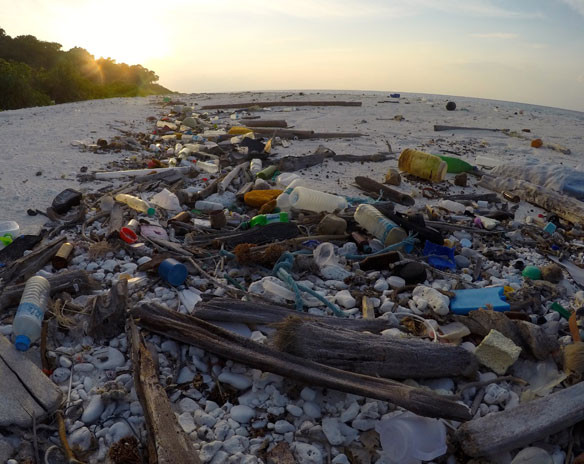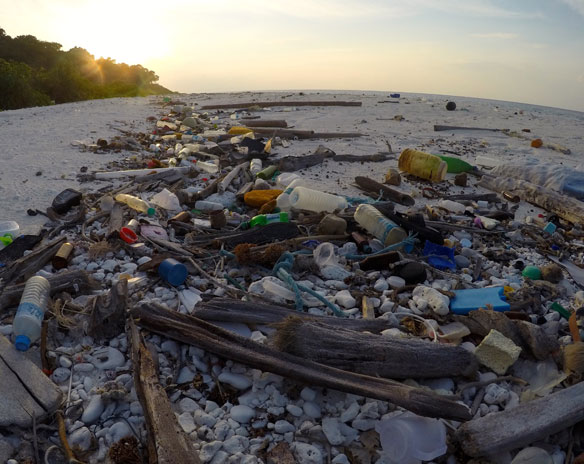
Although inhabited and remote, South Sentinel island is covered with marine debris, mostly plastic. South Sentinel, Andaman Islands, Bay of Bengal. Captions and Photo: © SAF — Coastal Care
Excerpts;
Greenpeace USA released the results of a comprehensive survey of the nation’s 367 material recovery facilities (MRFs) today, revealing that only PET #1 and HDPE #2 plastic bottles and jugs may legitimately be labeled as recyclable by consumer goods companies and retailers. The survey found that common plastic pollution items, including plastic tubs, cups, lids, plates, and trays, may not be labeled as recyclable according to Federal Trade Commission (FTC) requirements for products and labeling. Additionally, many full body shrink sleeves that are added to PET #1 and HDPE #2 bottles and jugs make those products non-recyclable as well.
“This survey confirms what many news reports have indicated since China restricted plastic waste imports two years ago — that recycling facilities across the country are not able to sort, sell, and reprocess much of the plastic that companies produce,” said Jan Dell, independent engineer and founder of The Last Beach Cleanup, who led the survey of plastics acceptance policies at the 367 MRFs.
Greenpeace has identified numerous examples of U.S. companies using misleading labels. Target, Nestlé, Danone, Walmart, Procter & Gamble, Clorox, Aldi, SC Johnson, and Unilever are among the companies that Greenpeace has asked to correct their labels, and some changes are underway. If companies show no willingness to end this deception, the organization plans to file formal FTC complaints…
Read Full Article; Greenpeace (02-18-2020)
America’s ‘recycled’ plastic waste is clogging landfills, survey finds; Guardian UK (02-18-2020)
Many plastic items that Americans put in their recycling bins aren’t being recycled at all, according to a major new survey of hundreds of recycling facilities across the US…
More Recycling Won’t Solve Plastic Pollution; Scientific American (07-06-2018)
Only 14% of plastics are recycled – can tech innovation tackle the rest? Guardian UK (02-22-2017)
Billions of pounds of plastic waste are littering the world’s oceans. Now, an organic chemist and a sailboat captain report that they are developing a process to reuse certain plastics, transforming them from worthless trash into a valuable diesel fuel with a small mobile reactor that could operate on land or at sea…
More than 8. 3 billion tons of plastics made: Most has now been discarded; Science Daily (07-19-2017)
Humans have created 8.3 billion metric tons of plastics since large-scale production of the synthetic materials began in the early 1950s, and most of it now resides in landfills or the natural environment, according to a study.
What are businesses doing to turn off the plastic tap? UNEP (06-28-2018)
These 10 companies are flooding the planet with throwaway plastic; Greenpeace (10-09-2018)
Nine months, six continents, 239 cleanup events, and more than 187,000 pieces of trash later, we now have the most comprehensive snapshot to date of how corporations are contributing to the global plastic pollution problem…
Over 180 countries -not including the US– agree to restrict global plastic waste trade; CNN (05-11-2019)
The governments of 187 countries have agreed to control the movement of plastic waste between national borders, in an effort to curb the world’s plastic crisis — but the United States was not among them…
Plastic Pollution: When The Mermaids Cry, The Great Plastic Tide, Coastal Care
Washed out on our coasts in obvious and clearly visible form, the plastic pollution spectacle blatantly unveiling on our beaches is only the prelude of the greater story that unfolded further away in the world’s oceans, yet mostly originating from where we stand: the land…









